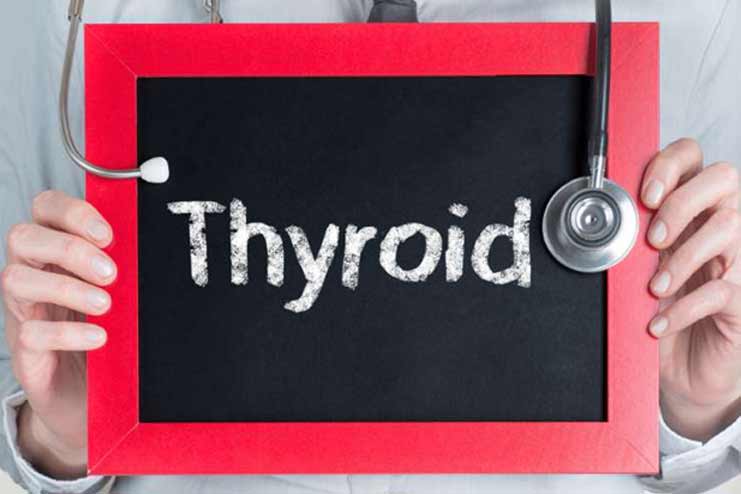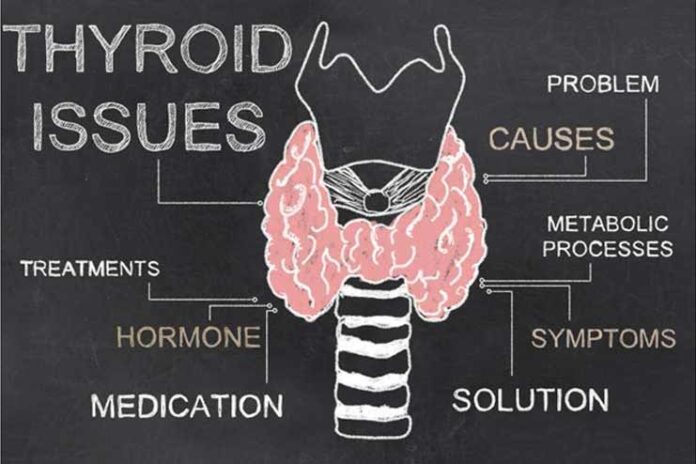Affiliate Disclaimer
Some links in this article are affiliate links. We may earn a small commission if you make a purchase through these links, at no extra cost to you. We only recommend products we find useful to our readersFatigue is a regular occurrence in today’s fast-paced world. However, chronic and inexplicable fatigue may indicate a medical condition. Thyroid disorders are one such illness that frequently presents as chronic fatigue.
If you have ever dealt with thyroid exhaustion, you know that it is not the same as a sleepless night or excessive stress. Thyroid fatigue often affects so many people that it becomes a daily struggle. This article examines the relationship between thyroid fatigue symptoms and how to spot possible thyroid issues.
Understanding the Thyroid

Your thyroid is a vital endocrine gland responsible for production and secretion of several hormones. Your metabolism, or how your body uses energy, is your thyroid’s primary function. There are occasions when your thyroid does not function as it should. The tiny thyroid gland, resembling a butterfly, sits near the base of the neck, directly below Adam’s apple. Even though it is relatively small, the thyroid gland plays a significant role in our body. It affects the functioning of several vital organs in our body, such as the skin, the liver, the kidneys, the heart, and the brain. When it comes to the general health of the body, it is of the utmost importance to ensure that the thyroid gland is in good health and is operating appropriately.
The thyroid gland generates triiodothyronine (T3) and thyroxine (T4) to control blood pressure, body temperature, heart rate, metabolism, and the body’s response to other hormones. These hormones circulate throughout the body and are responsible for their functions. T3 and T4 are the two essential thyroid hormones that are accountable for the regulation of metabolism. In the course of their journey through the bloodstream, these hormones affect a variety of organs and tissues. Energy levels in the body are considered in a state of equilibrium when the thyroid gland generates the appropriate quantity of T3 and T4. However, suppose the thyroid gland is not functioning correctly, either by producing an excessive or insufficient amount of hormone. In that case, it can result in a variety of health problems and unexplained fatigue.
Hypothyroidism and Fatigue

An underactive thyroid, or hypothyroidism, can seriously affect well-being and energy levels. One of the most common thyroid fatigue symptoms is persistent tiredness that often feels unexplainable. In addition to extreme exhaustion, people with hypothyroidism may also have a variety of symptoms, including weight gain, cold intolerance, dry skin, hair loss, and muscle weakness.
Thyroid gland produces the hormones that control the body’s metabolism and energy generation. When it performs poorly, these hormone levels decrease, slowing down metabolic activities. It might cause people to feel abnormally sluggish, even after a full night’s sleep, leading to a vicious cycle of inexplicable exhaustion.
Furthermore, thyroid dysfunction can cause thyroid and tiredness to become intertwined, making it challenging for those affected to identify the root cause of their fatigue. Weariness can make it difficult to go about everyday tasks and lower one’s quality of life. If you believe your energy levels are being affected by hypothyroidism, it is imperative that you speak with a healthcare provider for appropriate diagnosis and therapy.
Related Article: Best Yoga Poses For Thyroid Treatment
Other Symptoms of Thyroid Issues
Beyond only being tired, thyroid problems can cause a variety of symptoms that affect many facets of health:
- Sleep Apnea: If you have this condition, you occasionally stop breathing while asleep. It frequently accompanies snoring. Frequent apnea episodes might wake you up and disrupt your sleep since they lower your oxygen level. It may also leave you feeling worn out.
- Anemia: Low red blood cell counts, or anemia, are frequently seen with hypothyroidism. It may even be the initial indication of thyroid dysfunction.
- Iron Deficiency: Although iron deficiency frequently results in anemia, researchers have found that many thyroid patients may have severe fatigue due to iron insufficiency, even in the absence of anemia.
- Bad Sleep Habits: While your underlying thyroid condition may cause your sleeplessness and restless nights, your lousy sleep habits may also affect your weariness. According to the National Sleep Foundation, adults require seven to nine hours of sleep every night. However, a sizable portion does not consistently reach this requirement.
- Depression: Individuals with hyperthyroidism and hypothyroidism frequently have depressive symptoms. 24% of this population suffers from depression, and 42% from anxiety. If you think you might be depressed, make sure you visit your doctor. Therapy has the power to transform lives. It frequently entails taking an antidepressant, going to psychotherapy with a mental health professional, or doing both.
Also, read: Top 8 Hormone-Balancing Foods: Supporting Women’s Hormonal Health Naturally
Managing Thyroid Fatigue
Medications, dietary modifications, and lifestyle changes are all part of the integrative management of thyroid fatigue. Medical professionals often prescribe thyroid hormone replacement therapy to help patients regain hormonal balance. This treatment can effectively relieve symptoms such as thyroid and weariness, as well as unexplained lethargy. Routine monitoring and dosage modifications are crucial to guarantee the best possible results from treatment.
Adopting healthy lifestyle modifications can significantly improve thyroid health in addition to medication. Regular physical activity can increase vitality and enhance well-being in general. Including methods for reducing stress, such as yoga or meditation, can also lessen tiredness.
A healthy diet dramatically supports thyroid function. Balanced diet full of whole grains, fruits, vegetables, and lean meats provides essential nutrients. Thyroid-friendly foods include fish, nuts, and dairy products, which are also high in zinc, selenium, and iodine.
Two other ways to boost energy are maintaining hydration and avoiding processed foods. By combining medical intervention, proactive lifestyle choices, and dietary decisions, people can effectively manage symptoms associated with thyroid fatigue and restore their vitality.
When to See a Doctor

Suppose you are suffering persistent symptoms of thyroid fatigue, such as unexplained exhaustion, changes in weight, hair loss, or sensitivity to cold. In that case, you must seek the advice of a qualified medical practitioner about your condition. It is critical to be aware of the symptoms of thyroid dysfunction, as a timely diagnosis can result in efficient treatment and the avoidance of consequences.
A significant number of people tend to underestimate the influence that thyroid problems have, frequently attributing their feelings of fatigue and lethargy to variables related to their lifestyle or stress. Untreated thyroid problems, on the other hand, can have substantial impact on overall health and have the potential to develop into other complications, such as heart difficulties or infertility.
Getting tested for thyroid problems is a straightforward yet essential step when managing symptoms such as fatigue and thyroid problems. Blood testing can determine hormone levels, which can then direct treatment accordingly. To regain your energy and overall well-being, you should not be afraid to seek medical counsel if you feel that you may have a thyroid imbalance.
Conclusion
Thyroid function is critical in the complex dance between hormones and health. It’s often overlooked until exhaustion becomes a recurring companion. Understanding the wide range of the symptoms associated with thyroid fatigue is essential to regaining energy, vitality, and a high quality of life—not just alleviating symptoms. By recognizing when to seek assistance and adopting a comprehensive strategy that integrates medication with conscious lifestyle choices and healthy food, we enable ourselves to overcome the hold that unexplained exhaustion has over us.
References
- https://www.webmd.com/women/ss/slideshow-thyroid-symptoms-and-solutions
- https://www.verywellhealth.com/thyroid-disease-fatigue-3233188
- https://www.medicalnewstoday.com/articles/324535
- https://www.medicalnewstoday.com/articles/321287
- https://my.clevelandclinic.org/health/body/23188-thyroid
- https://www.aace.com/disease-and-conditions/thyroid/all-about-thyroid
- https://www.medicalnewstoday.com/articles/324535
- https://www.healthline.com/health/chronic-fatigue-and-hypothyroidism
- https://www.mdanderson.org/cancerwise/signs-of-thyroid-issues–hypothyroidism-hyperthyroidism-how-do-you-know-if-you-have-them.h00-159622590.html
- https://www.mayoclinic.org/diseases-conditions/hypothyroidism/symptoms-causes/syc-20350284
- https://www.hopkinsmedicine.org/health/conditions-and-diseases/disorders-of-the-thyroid
- https://www.sleephealthjournal.org/article/S2352-7218(15)00015-7/fulltext
- https://www.webmd.com/women/fatigued-or-full-throttle-is-your-thyroid-to-blame
- https://www.medicinenet.com/can_thyroid_problems_cause_extreme_fatigue/article.htm
- https://www.thyroid.org/patient-thyroid-information/ct-for-patients/may-2022/vol-15-issue-5-p-3-4
- https://www.healthline.com/nutrition/hypothyroidism-diet#foods-to-avoid
- https://www.stlukeshealth.org/resources/5-foods-improve-thyroid-function
- https://www.health.com/food/the-best-and-worst-foods-for-your-thyroid
- https://www.medicalnewstoday.com/articles/324819
In this Article



















